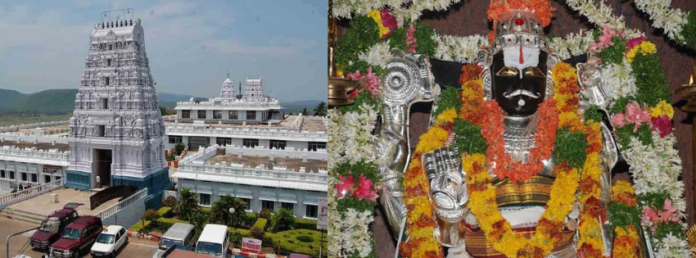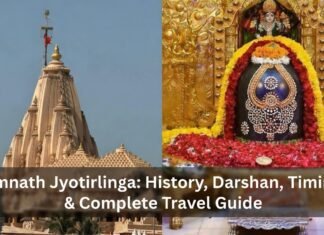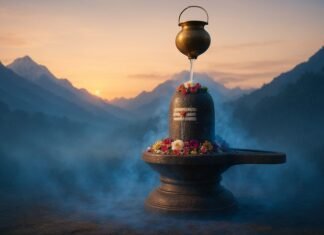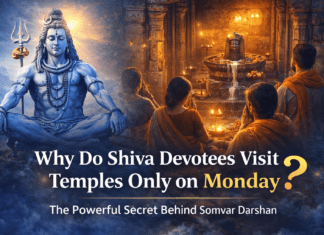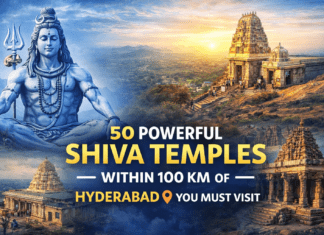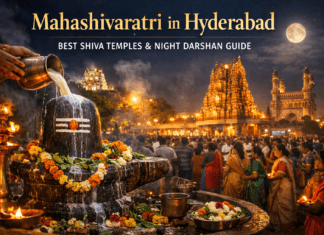Introduction:
Sri Venkateswara Temple, located in the picturesque town of Annavaram, Andhra Pradesh, is one of the most revered holy shrines in India. Ranking second in popularity only to Tirupati within the state, this temple stands as a testament to the rich cultural and spiritual heritage of the region. The temple is a blend of architectural beauty. Historical significance, and spiritual sanctity, making it a must-visit destination for devotees and tourists alike.
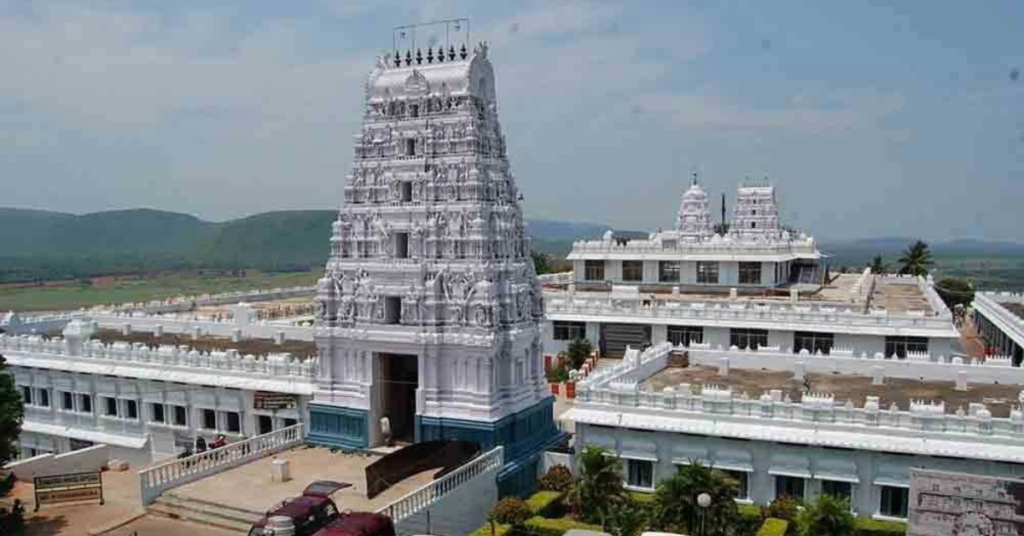
History and Significance of Annavaram Temple:
The Dravidian architectural style shapes Sri Venkateswara Temple, also called Sri Veera Venkata Satyanarayana Swamy Temple. The Revakhanda of the Skandapuranam extensively mentions the glory of Lord Satyanarayana Swamy. The deity, along with his consort Sri Anantha Lakshmi and Lord Shiva, resides on the Ratnagiri hill, a site named after Ratnakara, the son of Meru, the king of holy mountains. The sacred Pampa River, which touches the base of Ratnagiri, further enhances the temple’s divine aura.
The unique aspect of this temple is the worship of the Divine Trinity Brahma, Vishnu, and Shiva within a single idol, symbolizing the unity of creation, preservation, and destruction. This makes the temple a unifying place of worship for both Vaishnavites and Shaivites, attracting thousands of pilgrims daily.
Also read: Celebrate the Vibrant Gangamma Jatara Festival in Visakhapatnam
Legends and Sthala Purana:
The name “Annavaram” comes from two different stories. One story tells that people generously distributed food in the area, leading to the name derived from “Annam,” which means food in Telugu. Another version attributes the name to the blessings (varam) bestowed by the presiding deity, thus called Annavaram.
The legend of Ratnagiri Hill, where the temple stands, intertwines with tales of devotion and divine grace. Meruvu, the lord of the hills, and his consort Menaka performed great penance and received blessings, resulting in the birth of two sons, Bhadra and Ratnakar. Bhadra became Bhadrachalam, a hill on which Lord Rama resides, while Ratnakar transformed into Ratnagiri, where Lord Satyanarayana Swamy made his abode. Historical figures such as Sri Krishnadevaraya of Vijayanagar and the freedom fighter Alluri Sitarama Raju utilized the hill’s secret passages during their campaigns.
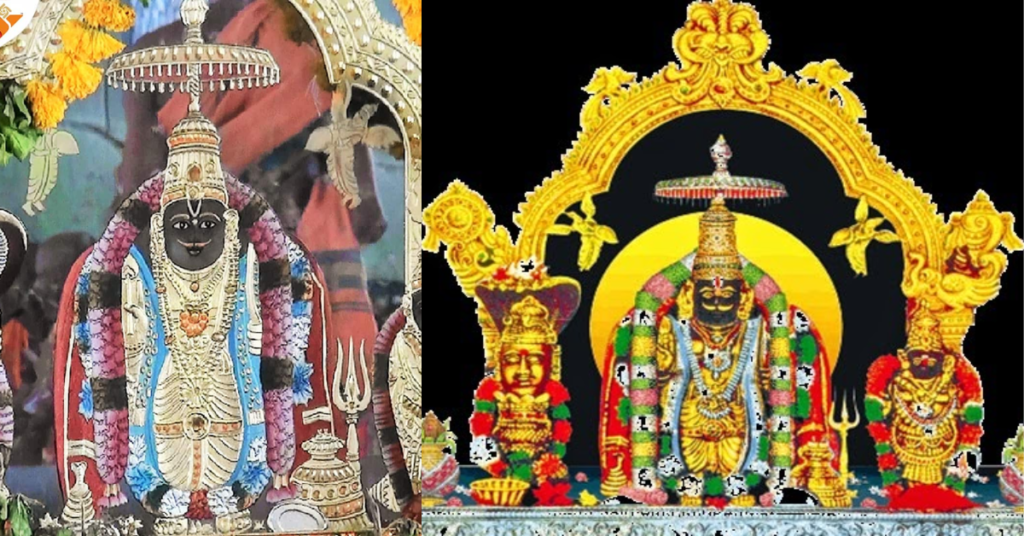
Architectural Marvel Of Annavaram Sri Venkateswara Temple:
The temple’s design resembles a chariot, representing the journey of the soul. The chariot’s wheels represent the Sun and the Moon, signifying the eternal movement of time. The temple’s design reflects the cosmic principles mentioned in ancient texts like the Agni Purana and Silpa Sastra. The temple’s unique architectural style aims to remind devotees of the universe, with the deity at the center representing the Supreme Spirit.
Also Explore: Sri Kanaka Mahalakshmi Temple: powerful goodness of vizag
Annavaram Temple Timings and Darshan Details:
For those planning to visit, the temple is open from 5:00 AM to 9:00 PM daily. Here’s a breakdown of the key timings and darshan details:
- Temple Timings: The temple is open from 5:00 AM to 9:00 PM, offering ample time for devotees to participate in various rituals and darshan.
- Vratham Timings: The Satyanarayana Swamy Vratham, a special ritual performed by devotees seeking blessings, is conducted throughout the day. However, specific timings can be confirmed at the temple or via online booking platforms.
- Annavaram Temple Darshan Tickets: Darshan tickets can be purchased directly at the temple. There are also options for special darshan tickets, which provide quicker access to the deity.
Annavaram Vratham: Significance and Legends:
Devotees perform the Satyanarayana Vratham to seek wealth, health, and overall prosperity. The ritual originated from a story about a poor Brahmin who received blessings from Lord Vishnu after following the Lord’s advice to perform the Vratham. This ritual is believed to offer significant benefits, including relief from troubles, success in endeavors, and spiritual growth.
The temple hosts thousands of devotees daily, with an average attendance of around five thousand people performing the Vratham. Devotees can perform the ritual on any day convenient for them, although Ekadasi is considered an auspicious day.
Annavaram Vratham Tickets Online Booking:
To facilitate the smooth participation of devotees in the Vratham, the temple authorities offer online booking services. Here are some details:
- Annavaram Vratham Tickets Online Booking: From here you can book your Vratham Tickets.
- Annavaram Vratham Ticket Price: 1116rs Every Day 09:00 AM Sri Swamy Vari Vratham (in absence of devotees) (Devotees can perform this Vratham online) “For more booking details, click here.”
Top Places to Visit around Annavaram:
- Sri Sita Ramachandra Swamy Temple Bhadrachalam
- Village of Parnasala
- Simhachalam Temple, Vaishnavism
- Kailasagiri
Here You Go With: Top 10 Must-Visit beautiful Places in Visakhapatnam
Conclusion:
Sri Venkateswara Temple in Annavaram is not just a place of worship but a beacon of spiritual guidance and historical importance. Whether you are seeking divine blessings, exploring ancient architecture, or understanding the legends that shaped this sacred space. A visit to Annavaram promises a fulfilling experience. The temple caters to the spiritual needs of its vast and diverse devotee base with facilities like online booking for Vratham and clear darshan timings.
Plan your visit, participate in the holy Vratham, and immerse yourself in the divine ambiance of Annavaram, where tradition meets tranquility.
Frequently Asked Questions(FAQs):
Answer: The temple is open daily from 5:00 AM to 9:00 PM.
Answer: You can book Vratham tickets online through the temple’s official booking portal.
Answer: The Vratham is a powerful ritual for seeking blessings for wealth, health, and prosperity.
Answer: The Dravidian architectural style defines the temple, with its design resembling a chariot.
Answer: The name “Annavaram” comes from stories of generous food distribution (“annam”) and blessings (“varam”) bestowed by the presiding deity.

